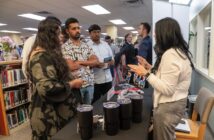By Adriana Rodriguez, Contributing Writer
“Studying abroad sounds wonderful, but it’s too expensive! There isn’t enough financial aid offered! The applications are too complicated! It’s only for American students!”
These are a few of the misconceptions that students typically entertain about the study abroad program, and they rob prospective participants of a once-in-a-lifetime opportunity.
“Studying abroad is taking a semester, year, or a summer to be able to study at another institution outside of Saint Leo’s main campus,” said Paige Ramsey-Hamacher, executive director, PDSO, and RO at the Center for Global Engagement at Saint Leo University.
Study abroad is available for all students. Hamacher was very clear in explaining that it wasn’t only students with United States citizenship who could apply for the program, but also international students who come to Saint Leo and would still wish to experience other places and cultures.
“I literally came in my freshman year just thinking about when I’m in my junior year, I want to do my study abroad,” Hannah Braverman, a Saint Leo student currently undergoing the process to study abroad in Italy, explained. “I’m going next year in 2022 for the Spring semester.”
A main reason behind participation is the opportunity not just to learn a new language, but to also strengthen the fluency and understanding of one that is currently known.
“For example, maybe their home language growing up was Spanish, but it’s really speaking Spanish. It’s not book and university-level Spanish,” said Hamacher.
Even when deliberately choosing a country with a familiar language to study abroad in, most students seem to forget about the existence of foreign dialects and customs.
“Sometimes I don’t think students realize that even though they’re going to a place where the same language is being spoken, they’re having to become fluent in culture as well,” said Hamacher.
When asked, Braverman confessed, “I was telling my mom, ‘Mami, I think I should just go to Spain. I already know Spanish, so it’s gonna be easy.’ She told me, ‘Hannah, you’re gonna make me pay for you to go study abroad, and you’re not even gonna learn a new language!?’”
In the end, Braverman acknowledged that going to a new place with a language barrier would result in a more wholesome experience.
Either way, a deeper understanding of language and culture is guaranteed when studying abroad as it is an immersive experience.
Then, there’s the financial misconception. Although there are, in fact, existing scholarships that are specifically geared towards students who study abroad, Saint Leo does not give out such specialized aid. Instead, it has partner programs that offer such scholarships to approved students on a needed basis.
After attending a study abroad seminar hosted by Hamacher, Braverman stated, “I emailed her and I told her that I was interested in the program, and asked about what other information she could provide me and she sent me a PowerPoint. There was a link to all the universities and all the programs that would be offered. She advised me to choose a program that would be partnered with Saint Leo so the financial aid would be covered.”
Fortunately, any pre-existing scholarships that Saint Leo has already approved for a student will serve as a replacement when that student wishes to study abroad. In this way, Saint Leo scholarships are more general and flexible in their financial aid.
“We’re already putting behind you when you go and study in one of our partner programs any financial aid that you’re already receiving, so there’s no additional ones that we give specifically to that,” Hamacher said.
For this reason, it is highly recommended that any student interested in studying abroad does so through one of Saint Leo’s partner programs as the possible additional financial aid offered by them could supplement the aid already given by Saint Leo.
“Figure out which one fits, which price, as far as overseas, works best within your price range,” said Hamacher. “We would then adjust the bill based on that and then we would subtract any financial aid scholarships, and then still whatever’s left is what you would owe. Or if you had federal and state aid that you were receiving that would go above and beyond what that is, then you could potentially get a refund.”
Of course, such a hypothetical refund is subject to change based on the cost of the chosen program and the current cost of attendance at the university.
“Basically, if the cost was $12,000 and the Saint Leo scholarship was $13,000, we’re not gonna give you a $1,000 refund back, but we would cover all $12,000 of the program price,” said Hamacher.
When applying for studying abroad, it is imperative to take the processing time of documents and deadlines into consideration in planning. Saint Leo provides its students with various websites like saintleo.abroadoffice.net and saintleo.edu/study-abroad, as well as help centers with advisers like those found in the Student Activities Building that can help in the process.
“If you’re on the main page, you can just go to saintleo.edu/international,” Hamacher added.
Although Saint Leo has been unable to send students to study abroad for the past year due to the COVID-19 pandemic, it is their hope to re-open the program in Spring 2022. It is up to the COVID Incident Command Team to determine this possibility.
This does not mean interested students shouldn’t get the necessary documentation in order as soon as possible. The current deadline for studying abroad submissions is Feb. 1, and all paperwork must be turned in by that time if students are aiming to participate in the program that following academic year.
“You have to go to Residence Life, the Registrar’s Office, Financial Aid, and they have to approve you for the program. Then after that, you have to go to [your]Academic Adviser and you guys talk about the classes…That’s not talking about [the]other process when you’re applying to the university itself…I would recommend starting a year before,” Braverman said.
Hamacher will be informing students more about the program and its deadlines in an upcoming seminar via Zoom on Nov. 15 from 3:00-4:00P.M. with the link being sent out in the weekly Student Activities Newsletter.




